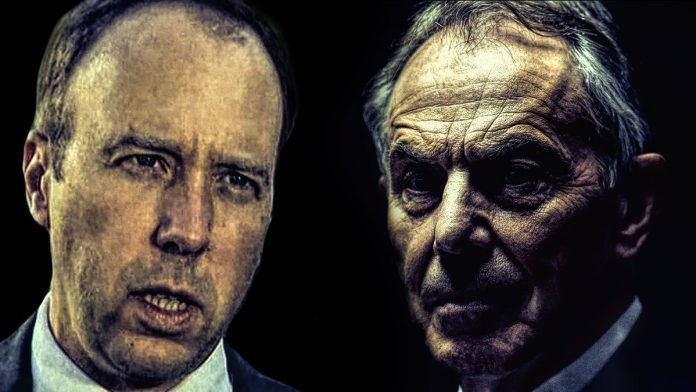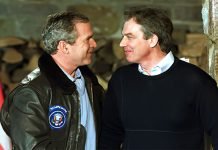The story beggar’s belief, Tony Blair in an argument with a Tory minister Matt Hancock about who should take credit for a delay in the second shot of the covid vaccine rollout.
Tony Blair has insisted that the idea to use a 12-week delay between coronavirus doses was his idea, after he was accused of stealing ideas from the Government and passing them off as his own.
A delay that is yet to be proved as effective as having the full dose within a shorter period of time as recommended by the manufactures. In fact, according to WHO’ experts, the Pfizer second dose should not be delayed, People should receive two doses of the Pfizer and BioNTech vaccine within 21 – 28 days without a delay before the second jab, the World Health Organisation (WHO) has said.
In a statement to CNBC, Pfizer said: “Pfizer and BioNTech’s Phase 3 study for the Covid-19 vaccine was designed to evaluate the vaccine’s safety and efficacy following a 2-dose schedule, separated by 21 days. The safety and efficacy of the vaccine has not been evaluated on different dosing schedules as the majority of trial participants received the second dose within the window specified in the study design.
However, we can all pontificate on these subjects all day long, as we now know everyone’s an expert on covid. But that’s not the point.
Both parties trying to take the credit
Blair published a paper in December calling for a delay between doses, arguing that it would allow more people to be protected from Covid-19 in a shorter space of time.
The Government later introduced such a policy, and a source close to Matt Hancock told the Mail on Sunday the Health Secretary was furious that Mr Blair had taken his idea and announced it as his own, and was no longer speaking to him.
On Friday Blair insisted the idea had come from conversations he had with experts, and he still had “perfectly good” relations with ministers.
“It came out of discussions I had with a range of experts and I published it just before Christmas,” he told an Institute for Government event.
“But having said that…I have a perfectly good relationship with people in Government.
“I am perfectly happy to work with them or interact with them.
“But getting into, I don’t quite know how to put it politely, a game of ‘who thought up what first’, is neither seemly or very sensible.”
A source had told the Mail on Sunday: “Matt was briefing Blair as a courtesy to a previous Prime Minister. But he cottoned on that Blair was milking these conversations.
“And that’s when Hancock said, ‘I’m not going to talk to you any more.”
It does make you wonder who will be willing to take responsibility for all the failings and over 120,000 deaths so far caused by incompetence.
The big question is why anyone is listening to Tony Blair

Tony Blair is the former prime minister that took the UK into an illegal war, he ordered a sexed up ‘dodgy dossier’ that helped to mislead parliament, he overstated the threat posed by Saddam Hussein, sent ill-prepared troops into battle and had “wholly inadequate” plans for the aftermath that has led on to continued war and tragedy throughout the middle east for the last three decades costing millions of lives.
For many the only talking Blair should conduct with the government is setting a trial date. Unfortunately, Blair not only has the ear of the Government, never mind they seem to fight for credit over ideas, he also has the ear of the New Labour leader Sir Keir Starmer who recently admitted to taking advice from both Tony Blair and Lord Mandelson, Blairs former right hand man.
This comes in contrast to the former Labour leaders views of Tony Blair, Jeremy Corbyn once stated Tony Blair ‘must explain the illegal Iraq war’ Corbyn was prepared to call for an investigation into Tony Blair for alleged war crimes during the Iraq War, according to reports.
Corbyn said: “I think it was an illegal war, I’m confident about that, indeed Kofi Annan confirmed it was an illegal war, and therefore he has to explain to that.
asked: “Is he going to be tried for it, I don’t know. Could he be tried for it? Possibly.”
Chilcot report showed Tony Blair’s Iraq War case was not justified
After the report, Jeremy Corbyn – who voted against military action – said the report proved the Iraq War had been an “act of military aggression launched on a false pretext”, something he said which has “long been regarded as illegal by the overwhelming weight of international opinion”.
When Jeremy Corbyn met with relatives of British service personnel killed in Iraq, Mr Corbyn said: “I now apologise sincerely on behalf of my party for the disastrous decision to go to war.“
He urged the UK to back moves to give the International Criminal Court “the power to prosecute those responsible for the crime of military aggression”.
A spokesman for some of the families of the 179 British service personnel and civilians killed in Iraq between 2003 and 2009 said their loved ones had died “unnecessarily and without just cause and purpose”.
He said all options were being considered, including asking those responsible for the failures identified in the report to “answer for their actions in the courts if such process is found to be viable”.
Unfortunately, Blair never had to answer for his part in the Iraq war. The closest he came to trial was in 2017 when the High Court blocked an attempt to bring a private prosecution against Tony Blair over the Iraq War.
Former Iraqi general Abdul Wahed Shannan Al Rabbat alleged the former prime minister committed “the crime of aggression” by invading Iraq in 2003.
No such crime exists in England and Wales and the court ruled there was “no prospect” of the case succeeding.
At the time a survey found that a third of British people wanted to see Tony Blair tried as a war criminal over Iraq.
Reacting to the ruling, a spokesperson for the attorney general’s office said the case had raised “important issues about the scope of the criminal law”.
“It should be for Parliament, and not the courts, to create new criminal offences. This principle was upheld when the House of Lords ruled in 2006 that the ‘crime of aggression’ does not exist in English law.
“In this legal challenge, we argued that this remains the case today and the courts agreed.”
The UK’s Iraq War inquiry, led by Sir John Chilcot, ruled the invasion had not been the “last resort” presented to MPs and the public.
His report ruled Mr Blair had overstated the threat posed by Saddam Hussein.
Michael Mansfield QC, appearing for Mr Al Rabbat, argued the report justified the prosecution of Mr Blair.
He said a paragraph in it could be summarised as concluding that Saddam Hussein did not pose an urgent threat to the interests of the UK.
It said the intelligence regarding weapons of mass destruction had been presented with “unwarranted certainty”.
Mr Mansfield told the court: “Nothing could be more emphatic than this evidence.
“It does not say there was an unlawful war or crime of aggression. It doesn’t need to because the criteria are arguably all there in that paragraph.”
Speaking 2016, Blair apologised to the families of those killed in the 2003 Iraq War but insisted he did what he thought was the “right thing” at the time.
Support Independent Journalism Today
Our unwavering dedication is to provide you with unbiased news, diverse perspectives, and insightful opinions. We're on a mission to ensure that those in positions of power are held accountable for their actions, but we can't do it alone. Labour Heartlands is primarily funded by me, Paul Knaggs, and by the generous contributions of readers like you. Your donations keep us going and help us uphold the principles of independent journalism. Join us in our quest for truth, transparency, and accountability – donate today and be a part of our mission!
Like everyone else, we're facing challenges, and we need your help to stay online and continue providing crucial journalism. Every contribution, no matter how small, goes a long way in helping us thrive. By becoming one of our donors, you become a vital part of our mission to uncover the truth and uphold the values of democracy.
While we maintain our independence from political affiliations, we stand united against corruption, injustice, and the erosion of free speech, truth, and democracy. We believe in the power of accurate information in a democracy, and we consider facts non-negotiable.
Your support, no matter the amount, can make a significant impact. Together, we can make a difference and continue our journey toward a more informed and just society.
Thank you for supporting Labour Heartlands












